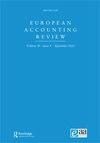Save Money to Lose Money? Implications of Opting Out of a Voluntary Audit Review for a Firm’s Cost of Debt*
IF 2.7
3区 管理学
Q2 BUSINESS, FINANCE
引用次数: 1
Abstract
ABSTRACT An audit review (AR) is a mechanism used by boards to assess the quality of interim financial reports on a timely basis. In Canada, the AR is voluntary, with listed firms mandated to disclose when they choose to not purchase additional audit verification. Given the relatively low cost of an AR, opting out of it can be regarded as a negative signal, especially in the context of lenders’ sensitivity to downside risk. Using a sample of 7,585 firm-year observations from 1,616 public firms in Canada over the period 2004-2015, we document that firms without a voluntary AR have a higher cost of debt than firms with an AR. Furthermore, after firms opt out of the AR, the increase in the cost of debt is accompanied by a rise in discretionary abnormal accruals and managers’ stock-based compensation. Moreover, no-AR firms are more likely to reduce post-switch private borrowing and have lower equity analyst following. Our study is the first to document that although listed borrowers that opt out of an AR have a higher cost of debt financing, they are concurrently able to engage in more earnings management and grant their managers higher stock-based compensation because of lower external monitoring.省钱还是赔钱?选择退出自愿审计审查对公司债务成本的影响*
审计复核(AR)是董事会用来及时评估中期财务报告质量的一种机制。在加拿大,审计责任是自愿的,上市公司被要求在选择不购买额外审计验证时进行披露。鉴于AR的成本相对较低,选择退出可被视为一个负面信号,尤其是在贷款机构对下行风险敏感的背景下。利用2004-2015年期间加拿大1616家上市公司的7585个公司年度观察样本,我们证明,没有自愿应收账款的公司比有自愿应收账款的公司有更高的债务成本。此外,在公司选择退出应收账款后,债务成本的增加伴随着可自由支配的异常应计项目和经理股票薪酬的增加。此外,没有ar的公司更有可能减少转换后的私人借贷,股票分析师的追随率也更低。我们的研究首次证明,尽管选择退出应收帐款的上市借款人的债务融资成本较高,但由于外部监督较低,他们同时能够参与更多的盈余管理,并向其经理授予更高的股票报酬。
本文章由计算机程序翻译,如有差异,请以英文原文为准。
求助全文
约1分钟内获得全文
求助全文
来源期刊

European Accounting Review
BUSINESS, FINANCE-
CiteScore
7.00
自引率
6.10%
发文量
58
期刊介绍:
Devoted to the advancement of accounting knowledge, it provides a forum for the publication of high quality accounting research manuscripts. The journal acknowledges its European origins and the distinctive variety of the European accounting research community. Conscious of these origins, European Accounting Review emphasises openness and flexibility, not only regarding the substantive issues of accounting research, but also with respect to paradigms, methodologies and styles of conducting that research. Though European Accounting Review is a truly international journal, it also holds a unique position as it is the only accounting journal to provide a European forum for the reporting of accounting research.
 求助内容:
求助内容: 应助结果提醒方式:
应助结果提醒方式:


